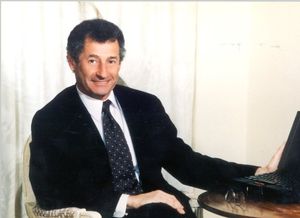Leonard Kleinrock: Difference between revisions
(Created page with "== Biography == Leonard Kleinrock is considered one of the fathers of the Internet for his development of packet-switching networks, providing the theory upon which the Interne...") |
(Clarify wording) |
||
| (11 intermediate revisions by 4 users not shown) | |||
| Line 1: | Line 1: | ||
== | {{Biography | ||
|Image=Leonard Kleinrock.jpg | |||
|Birthdate=1934/06/13 | |||
|Birthplace=Harlem, New York City, NY | |||
|Associated organizations=University of California; MIT | |||
|Fields of study=Computing | |||
|Awards=IEEE Alexander Graham Bell Medal | |||
}} | |||
Leonard Kleinrock is Distinguished Professor Emeritus of Computer Science at the University of California, Los Angeles. He made several important contributions to the field of computer science, in particular to the mathematical modelling of data communication in computer networking. | |||
Kleinrock's doctoral research at the Massachusetts Institute of Technology in the early 1960s pioneered the application of queuing theory to message switching networks. He later published several of the standard works on the subject in the 1970s, which launched a new field of research on the theory and application of queuing theory to computer networks. | |||
Dr. Kleinrock is an IEEE Life Fellow. In 2012 he received the [[IEEE Alexander Graham Bell Medal History|IEEE Alexander Graham Bell Medal]] “For pioneering contributions to modeling, analysis, and design of packet-switching networks.” He is currently a Distinguished Professor of Computer Science at UCLA, where has worked since 1963. | In 1967, at the University of California, Los Angeles (UCLA) he became involved in the U.S. Defense Advanced Research Project Agency’s (DARPA) [[ARPANET]] project. His laboratory received the first Interface Message Processor (IMP) for the ARPANET in September 1969, and one of his undergraduate students transmitted the first message ever sent over the ARPANET in October 1969. Kleinrock managed the software team at UCLA — including Steve Crocker, Jon Postel, and Vint Cerf — who developed the host-host protocol for the ARPANET, the Network Control Program (NCP). As the Network Measurement Center, his group evaluated the performance of the data communication in the ARPANET as it grew during the 1970s, and his mathematical work underpinned the understanding that packet-switched networks could provide highly efficient data communications and would not fail in a full-scale deployment. | ||
During the 1970s, Kleinrock’s pioneering work addressed packet switching networks, packet radio networks, local area networks, broadband networks, nomadic computing, peer-to-peer networks, and intelligent software agents. His theoretical work on hierarchical routing with student Farouk Kamoun remains critical to the operation of the Internet today. | |||
In 1988, Kleinrock was the chairman of a group that presented the report ''Toward a National Research Network'' to the U.S. Congress. This report influenced Al Gore to pursue the development of the High Performance Computing Act of 1991, which helped facilitate development of the Internet as it is known today. | |||
Dr. Kleinrock is an [[IEEE Fellow Grade History|IEEE Life Fellow]]. In 2012 he received the [[IEEE Alexander Graham Bell Medal History|IEEE Alexander Graham Bell Medal]] “For pioneering contributions to modeling, analysis, and design of packet-switching networks.” He is currently a Distinguished Professor of Computer Science at UCLA, where has worked since 1963. | |||
== Further Reading == | |||
[[Oral-History:Leonard Kleinrock|Leonard Kleinrock Oral History]] | |||
{{DEFAULTSORT:Kleinrock}} | |||
[[Category:Computing_and_electronics]] | |||
[[Category:Distributed_computing]] | |||
[[Category:Internet]] | |||
Latest revision as of 07:42, 4 May 2024
- Birthdate
- 1934/06/13
- Birthplace
- Harlem, New York City, NY
- Associated organizations
- University of California, MIT
- Fields of study
- Computing
- Awards
- IEEE Alexander Graham Bell Medal
Biography
Leonard Kleinrock is Distinguished Professor Emeritus of Computer Science at the University of California, Los Angeles. He made several important contributions to the field of computer science, in particular to the mathematical modelling of data communication in computer networking.
Kleinrock's doctoral research at the Massachusetts Institute of Technology in the early 1960s pioneered the application of queuing theory to message switching networks. He later published several of the standard works on the subject in the 1970s, which launched a new field of research on the theory and application of queuing theory to computer networks.
In 1967, at the University of California, Los Angeles (UCLA) he became involved in the U.S. Defense Advanced Research Project Agency’s (DARPA) ARPANET project. His laboratory received the first Interface Message Processor (IMP) for the ARPANET in September 1969, and one of his undergraduate students transmitted the first message ever sent over the ARPANET in October 1969. Kleinrock managed the software team at UCLA — including Steve Crocker, Jon Postel, and Vint Cerf — who developed the host-host protocol for the ARPANET, the Network Control Program (NCP). As the Network Measurement Center, his group evaluated the performance of the data communication in the ARPANET as it grew during the 1970s, and his mathematical work underpinned the understanding that packet-switched networks could provide highly efficient data communications and would not fail in a full-scale deployment.
During the 1970s, Kleinrock’s pioneering work addressed packet switching networks, packet radio networks, local area networks, broadband networks, nomadic computing, peer-to-peer networks, and intelligent software agents. His theoretical work on hierarchical routing with student Farouk Kamoun remains critical to the operation of the Internet today.
In 1988, Kleinrock was the chairman of a group that presented the report Toward a National Research Network to the U.S. Congress. This report influenced Al Gore to pursue the development of the High Performance Computing Act of 1991, which helped facilitate development of the Internet as it is known today.
Dr. Kleinrock is an IEEE Life Fellow. In 2012 he received the IEEE Alexander Graham Bell Medal “For pioneering contributions to modeling, analysis, and design of packet-switching networks.” He is currently a Distinguished Professor of Computer Science at UCLA, where has worked since 1963.
